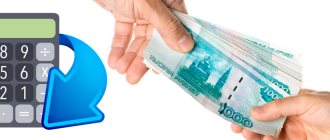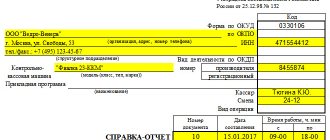Accounting for interest on the loan amount in VAT
The Ministry of Finance of Russia, in letter No. 03-07-14/216 dated January 10, 2020, explains how to take into account interest accrued on a loan provided, as well as interest for the use of someone else’s funds when determining the proportion for separate accounting of VAT amounts.
Separate accounting
The purpose of separate accounting is to correctly write off the input VAT presented by suppliers of goods (works, services). Therefore you need:
- the amount of tax on purchased goods (works, services) that are intended to carry out transactions subject to VAT shall be deducted;
- the amount of tax on purchased goods (works, services) that are intended to carry out transactions not subject to VAT is written off as an increase in their value.
As officials indicated, in this case it is necessary to calculate the proportion in which the purchased services are used in activities subject to VAT.
The proportion is determined in the manner prescribed when maintaining separate VAT accounting (clause 4.1 of Article 170 of the Tax Code of the Russian Federation). Based on this proportion, the part of the VAT relating to transactions subject to VAT is accepted for deduction, and the part corresponding to transactions not subject to this tax is included in the cost of the service (clause 4 of Article 170 of the Tax Code of the Russian Federation). Moreover, the organization must provide for the procedure for maintaining separate VAT accounting in its accounting policies.
Interest on loans provided
When issuing loans in the form of cash or securities, the organization charges interest for the use of funds. The amounts of accrued interest are exempt from VAT (clause 15, clause 3, article 149 of the Tax Code of the Russian Federation).
Thus, if in the same tax period interest is accrued on such loans and transactions subject to VAT are carried out, input VAT on them is accounted for separately. In the part related to activities subject to VAT, it is taken as a deduction, and in the part related to non-taxable activity, it is taken into account in the cost of goods (work, services) sold and property rights.
With regard to accounting for interest on a cash loan, the Supreme Court of the Russian Federation, guided by the position of the Plenum of the Supreme Arbitration Court of the Russian Federation dated May 30, 2014 No. 33, indicated the following. If an organization issues interest-bearing loans to third parties, then the VAT tax base does not include both the loan amount itself and the interest amounts. Moreover, the loan amount is not subject to VAT, but the amount of interest for VAT purposes qualifies as revenue from the provision of financial services for the provision of a loan in cash. Therefore, when calculating the proportion for separate accounting of “input” VAT, the revenue from transactions not subject to this tax also includes the amount of interest accrued on the loan amount (determination of the Supreme Court of the Russian Federation dated June 26, 2015 No. 308-KG15-6478).
Example. How to account for income in the form of interest on a loan
In the third quarter of 2021, Romashka LLC accrued interest on the loan it issued earlier in the amount of RUB 90,000. In addition, the company shipped goods worth RUB 480,000 to customers. (including VAT RUB 80,000). In the same period, the company paid for the rent of office space, which is used in both taxable and non-taxable activities, in the amount of 180,000 rubles. (including VAT = 30,000 rubles).
Total revenue amounted to:
90,000 rub. + (480,000 rub. – 80,000 rub.) = 490,000 rub.
The share of the transaction not subject to VAT in the total revenue is equal to:
90,000 rub. : 490,000 rub. x 100% = 18.37%
The amount of input VAT taken into account as part of office rental expenses will be:
30,000 rub. x 18.37% = 5511 rub.
VAT can be deducted in the amount of:
30,000 rub. – 5511 rub. = 24,489 rub.
The amount of expenses related to the VAT-free interest accrual transaction will be:
(RUB 180,000 – RUB 30,000) x 18.37% + RUB 5,511 = 33,066 rub.
The amount of expenses related to activities subject to VAT will be:
150,000 rub. – (180,000 rub. – 30,000 rub.) x 18.37% = 122,445 rub.
Please note: there is one exception to the general procedure. If in any quarter the share of total costs for the production of goods (works, services) not subject to VAT does not exceed 5% of the total production costs, the entire amount of input VAT can be deducted (clause 4 of Article 170 of the Tax Code of the Russian Federation ).
Interest on using someone else's money
In accordance with Art. 395 of the Civil Code of the Russian Federation, payment of interest for the use of someone else’s funds is made as a result of unlawful withholding, evasion of their return, other delay in their payment, or unjust receipt or savings at the expense of another person. That is, the payment of such interest is a measure of liability for violation of an obligation, and not payment for goods (work, services) sold.
Officials note that such amounts of interest collected, including by court decision, in the proportion determined on the basis of the cost of goods shipped (work performed, services rendered), transferred property rights for the tax period, are not taken into account.
Is interest subject to VAT under Article 317.1 of the Civil Code of the Russian Federation?
Recently, the Russian Ministry of Finance spoke on this issue for the first time (letter dated August 3, 2021 No. 03-03-06/1/45600). But such a letter can hardly be characterized as really explaining anything. It does not contain a direct answer to the question posed. However, in a number of publications, it was concluded that the Ministry of Finance was in favor of imposing VAT on the legal interest received by the seller in connection with the sale of goods, works, and services. This is how a Ministry of Finance specialist responded privately to a call from one of the leading specialized publications regarding the actual meaning of this letter.
But is it really possible to read such an answer even between the lines of this letter? In our opinion, rather the opposite. The financiers simply did not want to directly say in the letter that legal interest received under Article 317.1 of the Civil Code of the Russian Federation is not subject to VAT. As a result, the text of the letter includes language that gives it ambiguity in the absence of a clear answer. A different interpretation of the position actually taken by financiers on this issue would mean that financiers have radically revised their position on similar situations, in particular on the non-taxation of VAT on interest on a commercial loan. Such clarifications are contained in the letter of the Ministry of Finance of Russia dated June 17, 2014 No. 03-07-15/28722, which was sent to the tax inspectorates for use in their work (letter of the Federal Tax Service of Russia dated July 8, 2014 No. GD-4-3/13219). The letter is based on the provisions of paragraph 12 of the resolution of the Plenum of the Supreme Court of the Russian Federation dated October 8, 1998 No. 13 and on conclusions from arbitration practice (resolution of the FAS of the Volga District dated August 7, 2012 No. A12-542/2012 for which there is a refusal determination by the Supreme Arbitration Court of the Russian Federation from November 1, 2012 No. BAS-14084/12). Previously, the Ministry of Finance took exactly the opposite position (letters dated August 19, 2013 No. 03-07-11/33756 and dated March 20, 2009 No. 03-07-11/75). They stated that the interest that the buyer transfers to the seller for installment payment is fully included in the calculation of the VAT tax base.
Legal interest under Article 317.1 of the Civil Code of the Russian Federation is essentially similar to interest on a commercial loan; it is also accrued specifically for the use of other people’s funds, and not for the goods sold themselves. Therefore they should also not be subject to VAT. After all, they are in no way connected with payment for goods sold in the sense of clause 2, clause 1, Article 162 of the Tax Code of the Russian Federation. It was precisely because of the lack of such a connection that the Ministry of Finance ultimately agreed with the non-imposition of VAT on fines and penalties received by sellers, as recognized by the arbitrators.
Moreover, this conclusion with regard to legal interest is valid both for the period before August 1, 2021, and after. Let us recall that on August 1, 2016, paragraph 4 of Article 1 of the Federal Law of July 3, 2016 No. 315-FZ “On Amendments to Part One of the Civil Code of the Russian Federation and certain legislative acts of the Russian Federation” came into force, according to which paragraph 1 of Article 317.1 of the Civil Code RF is presented in a new edition.
What did the financiers really say? Let's look at the text of the letter. It says that: “Subclause 2 of clause 1 of Article 162 of the Tax Code of the Russian Federation stipulates that the tax base for value added tax increases by amounts received for goods (work, services) sold in the form of financial assistance, to replenish special-purpose funds, increases in income or otherwise related to payment for goods (work, services) sold. Thus, if the amounts received by the seller of goods (work, services) under a monetary obligation for the use of funds are amounts related to payment for the goods (work, services) sold by him, subject to value added tax, then such amounts are subject to inclusion in tax base for value added tax." In other words, financiers point out that if the funds received from the buyer, formally according to the contract, are legal interest, but in essence are an element of pricing - a hidden form of payment, then they are subject to VAT.
Let's imagine a situation where the delivery price is underestimated, and for deferred payment the parties have established in the contract interest under Article 317.1 of the Civil Code of the Russian Federation at the rate of 1% or even higher per day. In such a situation, we are already talking about an unjustified tax benefit and the reclassification of amounts received from interest into amounts otherwise associated with payments for goods sold.
A similar idea, but much more clearly, was voiced by the Ministry of Finance in the situation with fines (letter dated March 4, 2013 No. 03-07-15/6333). It states that if the amounts received by sellers from buyers, stipulated by the terms of contracts in the form of a penalty (fine, penalty), are essentially not a penalty (fine, penalty) ensuring the fulfillment of obligations, but in fact relate to the element of pricing that provides for payment for goods ( works, services), then such amounts are included in the tax base for value added tax on the basis of the above-mentioned norm of Article 162 of the Code. At the same time, from the text of the 2013 letter it clearly follows that with regard to “ordinary” penalties, the Ministry of Finance agrees with the approach of the courts regarding the non-imposition of VAT on them. So honest taxpayers should hardly be afraid of the new letter from financiers. If the amount of interest specified in the agreement with the buyer under Article 317.1 of the Civil Code of the Russian Federation does not differ much from market lending rates, then the likelihood of claims for non-taxation of VAT on such legal interest received, in our opinion, is very small. And if a dispute with the tax authorities does arise, then the chances of winning it in court, on the contrary, are very high.
How to determine interest income from a lender
Borrowing operations are not uncommon: enterprises and individuals are trying to help each other with finances. The procedure for determining interest income on such transactions was specifically explained by the leading expert of Norma, Natalya MEMETOVA:
– Let’s consider the situation of issuing a loan using the example of a commercial enterprise – a resident of Uzbekistan. For convenience, we present a table in which we reflect the procedure for determining interest income and its taxation:
| Index | Interest-free loan | Interest loan |
| Lender's income | Doesn't occur | Arises |
| How is the lender's income determined? | Not determined | At the rate stipulated by the contract |
| Taxation at the lender (income tax or turnover tax) | Is not a subject to a tax | Interest is included in the lender's total income. Taxable:
|
| Reflection in the tax reporting of the enterprise | Not reflected |
|
| Paying tax | Not paid | On time for payment of income tax/turnover tax |
| Interest accounting | Not maintained |
Dt – Kt.
Dt – Kt |
| Reflection in financial statements | Not reflected | In the balance sheet, if there are interest receivables at the reporting date, in line 310. In the OFR - in line 130 “Income in the form of interest” |
Maintain interest income on an accrual basis. Reflect them in the reporting period to which they relate, regardless of the time of receipt of money. The same approach is provided for tax purposes.
Accrue interest monthly based on the number of days the loan was used in the current month.
Example Calculation of interest income
On June 15, the company issued a loan in the amount of 10,000,000 soums. subject to interest payment at a rate of 14% per annum. Loan term – 7 months.
Interest is accrued from the date the loan is issued, i.e. from June 15. In June, we accrue interest for 16 days (from June 15 to June 30).
Interest income for June:
10,000,000 x 14%: 365 x 16 days = 61,369.86 sum.
Interest income for July will be:
10,000,000 x 14%: 365 x 31 days = 118,904.11 sum.
Income for subsequent months is determined similarly.
An enterprise will include accrued interest in comprehensive income when calculating income tax or sales tax, regardless of when the interest is received:
- for June - in the reporting for the first half of the year;
- for July - in reporting for 9 months, etc.
How to calculate interest if the year is a leap year
The calculation of interest on loans, deposits and borrowed funds, debt securities and other financial instruments by commercial banks of Uzbekistan is regulated by a special Regulation. According to it, interest on loans is usually calculated based on an annual base period of 365 days.
But this Regulation was developed for commercial banks. Other economic entities have the right, but are not obliged, to adhere to this norm. It is up to you to decide which number of days – 365 or 366 – to use in a leap year to calculate interest.
The chosen procedure for calculating interest income is reflected in the accounting policy.
Should interest income be determined based on the refinancing rate?
No no need. Interest income is determined based on the rate specified in the agreement.
In the example above, the contract rate is 14%, although the refinance rate is 15%.
The refinancing rate is used to determine the income of borrowing enterprises.
Is interest subject to VAT?
No, interest on loans is not subject to VAT.
Experts' explanations reflect their opinions and create an information basis for you to make independent decisions.






